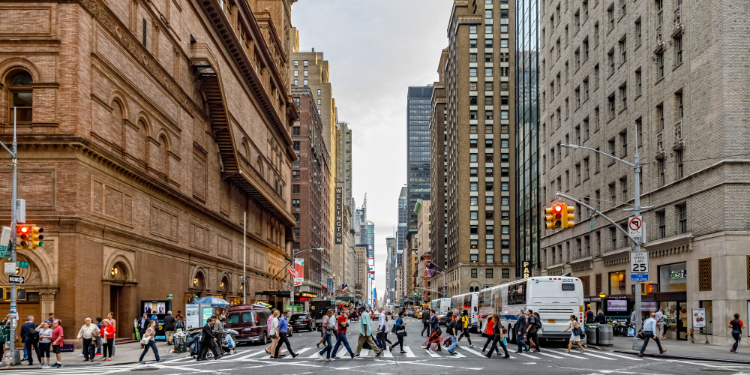
Why should you choose big city life over living in a small town? The choice might not be obvious if you're considering relocating abroad, whether alone or with your family. Over the years, many expats have found it easier to live in a big city for various reasons. Find out, with Expat.com, why you should move to a big city, regardless of your motivations.
Career opportunities are plentiful

Most multinational companies, as well as large, medium and local businesses, choose to relocate to big cities. In this way, they not only access to a broader consumer market but also a wider workforce. It's therefore wise to move to a big city, whether you're studying abroad or looking for career prospects like work or starting a business, or as a digital nomad. Those who are already on the spot will tell you how easy it is to look for a job in a big city where opportunities are plentiful in a wide range of fields. In small towns, on the other hand, some sectors might have restrictions, or the labour market might be saturated, so you will have to look for work in neighbouring areas anyway. If you still choose to live and work in a small town, you could be compelled to accept a less rewarding job – which will make you unhappy. For those looking to expand their business, a big city means access to a broader consumer market, so you will be able to test and improve your products and services more efficiently according to the demand. Regarding digital nomads, most of them generally prefer relocating to a remote region for better quality of life and the feel of being on vacation all the time. However, you're more likely to have fast internet and a more extensive choice of modern coworking spaces in big cities. If you still have a doubt, keep in mind that larger companies operating in big cities tend to offer more attractive salaries to expats.
It's easier to get around

In most big cities around the world, it's easier to get around thanks to an extensive transportation network. Trains, metro, taxis, buses, and tramway in some cities, are available to commute to work, to university, or go shopping and travelling around. In Asian cities, for example, you can also find more traditional means of transportation like the tuk-tuk, moto taxi and rickshaw, so in any case, you neither have to wait for long nor have to travel long distances which can be exhausting daily. Transportation in big cities is usually regular and punctual. In small towns, it can be hard to find a taxi, so you might have to rent or buy a car – which means additional expenses. Many big cities also have walking and cycling tracks so you won't even have to use public transportation – you can just walk to the nearest supermarket or the park, for example.
Networking

Moving to a big city is an excellent way to discover new cultures and expand your social and professional networks. While it's true that small towns offer better exposure to local customs and traditions and the local cuisine, integration can be more complicated actually. On the other hand, in big cities, you can find a wide range of local and international restaurants, typical cafes, as well as large and world famous food chains. Besides, there's always some cultural, artistic or professional even taking place and you can take advantage of these to expand your social and professional networks. It's also worth noting that https://www.expat.communities tend to grow more rapidly in big cities – which makes it easier to adapt and make new friends. While moving to a small town is best to live like a local, the nature of people around you, whether it's your colleagues or neighbours, can be tricky. In big cities, on the other hand, you can easily bind with people over a cup of tea or coffee or at the park while jogging.
There's much to see and to do

Relocating abroad means discovering a whole new world and the surroundings during your free time. While small towns are closer to nature and authentic sites to visit, don't think that big city life can get boring. In big cities, there's much to see and to do, like visiting monuments and historical sites, temples, palaces and museums. Most big cities also have huge green spaces where you can relax or indulge in outdoor activities unless you prefer to join a gym. The long list of things to do includes restaurants, cafes, shopping malls and boutiques for shopaholics, bars and pubs, theatres, opera houses, cinema halls and theme parks for everyone. You will also enjoy a myriad of cultural, religious and artistic festivals, as well as international events like conferences and exhibitions taking place all year round. Once you feel you have made your new city your new home, you can go and visit the surrounding areas.
A convenient everyday life

Life is usually cheaper in small towns than in big cities. However, keep in mind that you're more likely to find accommodation, international schools for your kids, quality health care, large shopping malls, hypermarket and grocery stores, as well as the foreign brands and products you're used to in big cities, so you won't always have to compromise. Big cities also have local markets where you can buy fresh and cheap produce. If you're planning a night out with your partner or friends, you can rely on public transportation which provides night service. If safety is an issue, it's evident that a bustling big city that has a vibrant nightlife and a warm and cosmopolitan population usually tends to be safe. You can also rely on the large https://www.expat.community in times of need.
What about you? Would you relocate to a big city rather than a small town? Should you want to share your experience or give out tips to soon-to-be expats, feel free to drop us a comment below.




















Comments
1